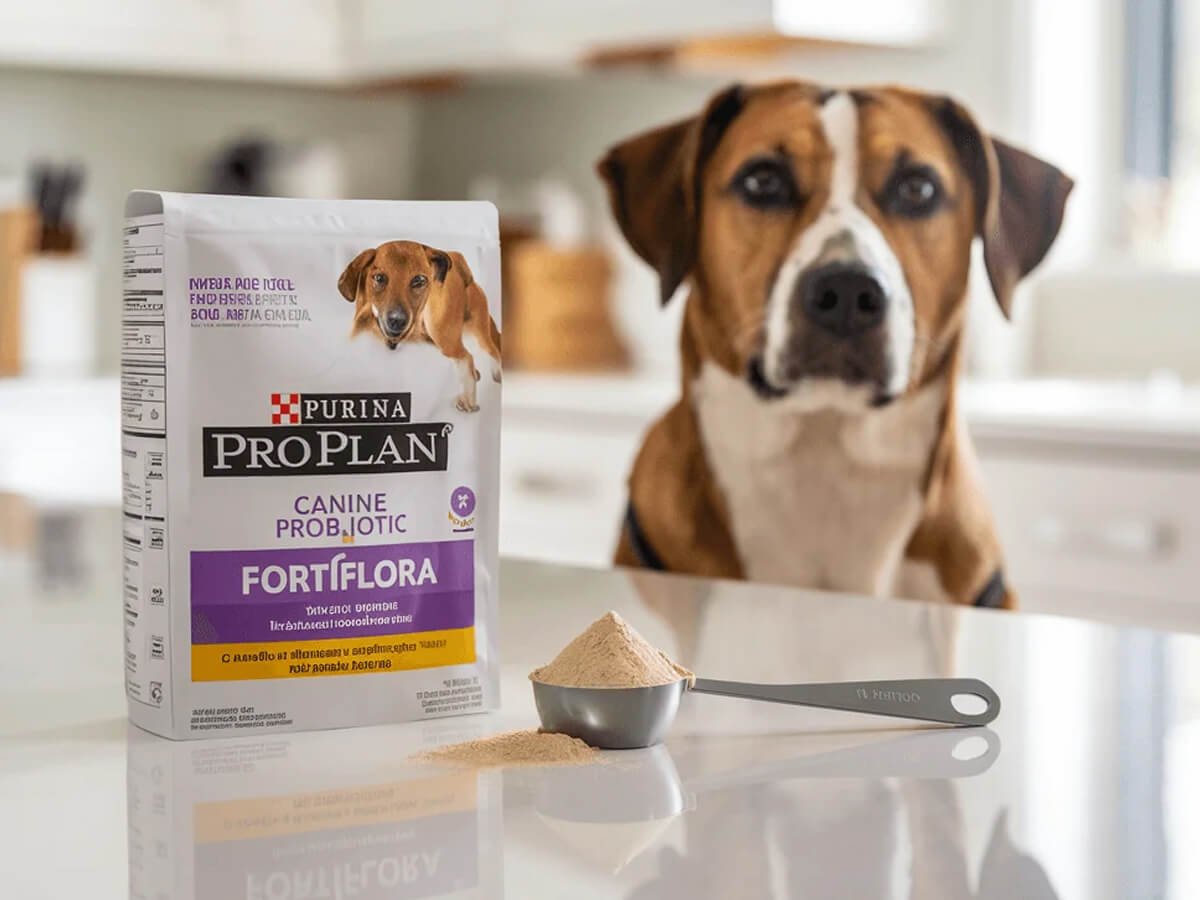In the battle against climate change, we often overlook the most humble soldiers on our front lines: garbage trash bags. While we focus on electric vehicles and solar panels, the simple act of how we contain and manage our waste plays a crucial role in our environmental footprint. Consider this: every day, millions of households reach for products like Glad Tall Kitchen Drawstring Trash Bags without realizing they’re making a climate-relevant decision. At just $0.19 per bag, these everyday items represent an accessible entry point into sustainable living that doesn’t require massive lifestyle changes or investments.
But how exactly can something as mundane as a trash bag help combat one of humanity’s greatest challenges? 🌎 The answer lies not just in the bag itself, but in the entire waste management ecosystem it supports. When properly integrated into a comprehensive waste strategy, the humble trash bag becomes a powerful tool for sorting, containing, and directing waste toward appropriate processing channels—whether that’s recycling, composting, or responsible disposal. As we’ll explore in this post, understanding trash bags as environmental tools requires us to look beyond their basic function and see them as critical components in the economics of sustainable waste management, featuring innovative designs that make them increasingly climate-friendly.
- FORCEFLEX TECHNOLOGY: Tall kitchen garbage bags expand around sharp edges and heavy loads, so you can pack in the trash …
- 2 LAYERS EXTRA LEAK PROTECTION: These 13 gallon kitchen trash bags are designed with 2 layers to handle heavy loads and …
- SCENTED GARBAGE BAGS: These Glad kitchen trash bags with Febreze Freshness infuse your space with just a hint of sparkli…
Table of Contents
ToggleUnderstanding Trash Bags as Environmental Tools
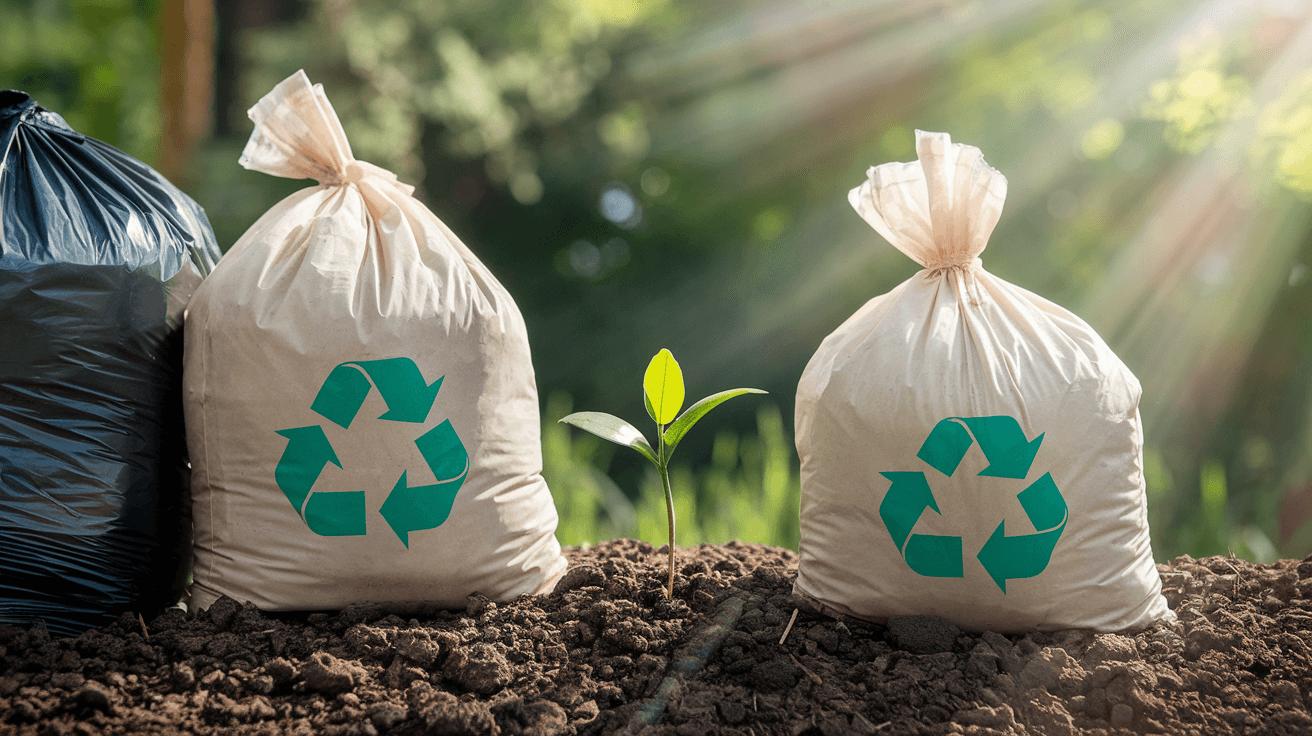
Understanding Trash Bags as Environmental Tools
The Evolution of Modern Garbage Bags
Garbage trash bags have come a long way from their simple beginnings as mere waste containers. Today, they represent an important frontier in the fight against climate change. The evolution has been marked by significant innovations, particularly with the emergence of compostable bags made from renewable materials like sugar, cellulose, and corn fibers. These eco-friendly alternatives significantly reduce the carbon footprint associated with traditional plastic waste management.
A notable development in this evolution is the pioneering work of entrepreneurs like Mohammed Azhar Mohiuddin, whose venture Bio Reform has successfully replaced millions of conventional plastic bags with plastic-like carrier bags made from sustainable materials. This initiative demonstrates how garbage bags are transforming from environmental problems into environmental solutions.
How Quality Trash Bags Prevent Waste Leakage
High-quality garbage trash bags play a crucial role in preventing waste leakage, which is a significant contributor to environmental pollution. The durability and strength of well-designed bags ensure that waste remains contained during collection and transportation, minimizing the risk of litter entering ecosystems.
Certified compostable bags offer both containment benefits and end-of-life advantages. When properly certified by reputable third parties like ASTM D6400 or BPI, these bags meet strict composting standards. However, it’s important to note that even compostable bags require specific conditions to break down properly—most need industrial composting facilities rather than home composting bins or landfills.
For those seeking alternatives, bags made from post-consumer recycled plastic provide another option. These utilize existing plastic waste, reducing the demand for virgin materials while maintaining the strength needed to prevent leakage.
The Role of Proper Waste Containment in Reducing Pollution
Proper waste containment through quality garbage trash bags directly impacts pollution levels across multiple environments. When waste is securely contained, it prevents the breakdown of plastic into harmful microplastics that contaminate soil, water systems, and eventually enter the food chain.
The plastics industry, including trash bag production, could account for over 56 gigatons of carbon emissions from now until 2050. This staggering figure highlights why proper waste containment and management are essential components of climate change mitigation strategies.
Beyond containment, the type of bag used matters significantly. Traditional plastic bags can take hundreds of years to decompose, while compostable alternatives break down much faster under the right conditions. Biodegradable materials like PBAT (Polybutylene adipate-co-terephthalate) decompose more rapidly than conventional plastic, though consumers should be wary of unregulated “biodegradable” claims that may constitute greenwashing.
Effective waste containment also supports comprehensive waste management strategies. When organic waste is properly contained in compostable bags, it can be diverted to industrial composting facilities where it transforms into nutrient-rich compost rather than generating methane in landfills.
With a solid understanding of how garbage trash bags function as environmental tools, let’s now examine the economic aspects of these sustainable waste management solutions in the next section, “The Economics of Sustainable Waste Management.”
- FORCEFLEX TECHNOLOGY: Tall kitchen garbage bags expand around sharp edges and heavy loads, so you can pack in the trash …
- 2 LAYERS EXTRA LEAK PROTECTION: These 13 gallon kitchen trash bags are designed with 2 layers to handle heavy loads and …
- SCENTED GARBAGE BAGS: These Glad kitchen trash bags with Febreze Freshness infuse your space with just a hint of sparkli…
The Economics of Sustainable Waste Management
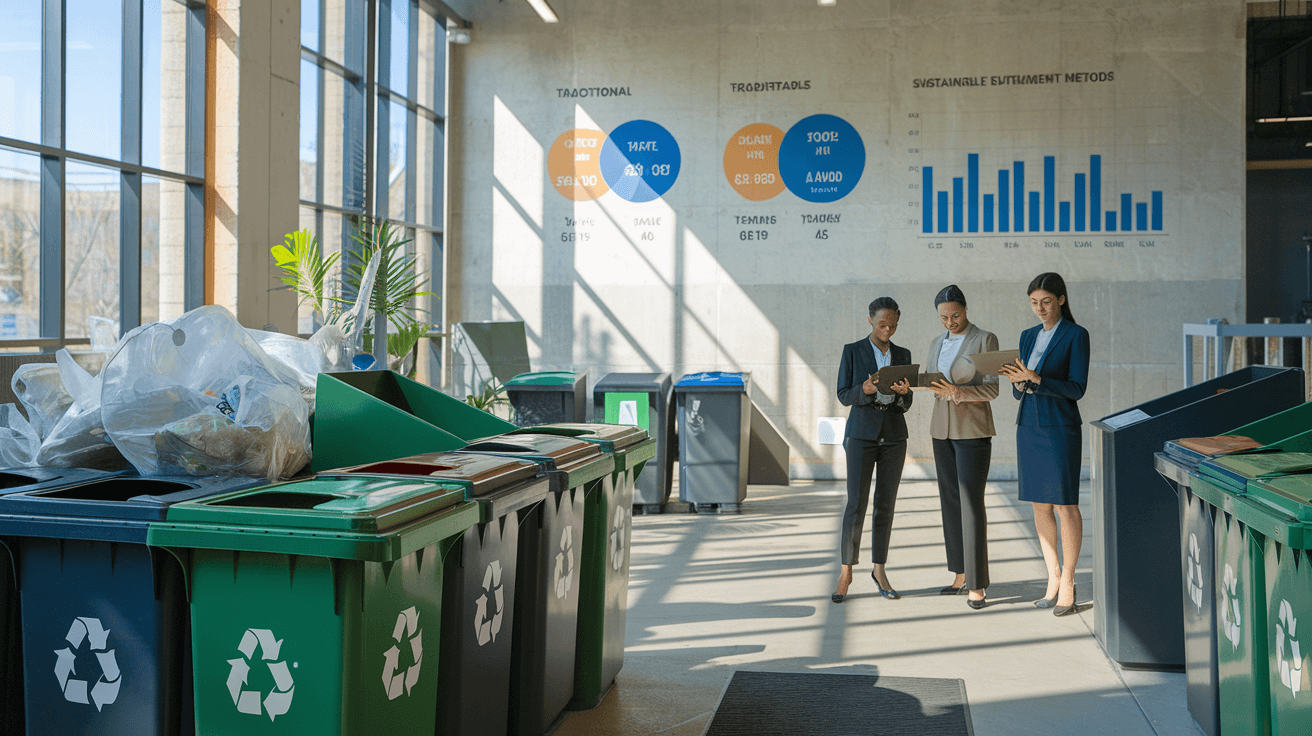
The Economics of Sustainable Waste Management
Now that we understand how trash bags serve as environmental tools, let’s explore the financial aspects of sustainable waste management solutions. While transitioning to eco-friendly options is essential for our planet, it’s equally important to consider economic feasibility for widespread adoption.
A. Cost-effective options like Glad Tall Kitchen Drawstring Bags
The market now offers various economical yet environmentally responsible options for waste disposal. Products like Glad Tall Kitchen Drawstring Bags represent a balance between functionality and sustainability. Similar to how Mohammed Azhar Mohiuddin’s Bio Reform venture has successfully replaced millions of conventional plastic bags across small businesses in India, mainstream manufacturers are developing alternatives that reduce environmental impact without breaking the bank.
These solutions leverage advances in material science to create products that minimize carbon footprints while maintaining the durability and convenience consumers expect. By incorporating biodegradable materials like PBAT (Polybutylene adipate-co-terephthalate), which decomposes significantly faster than conventional plastic, these bags contribute to sustainable waste management practices without sacrificing performance.
B. Price comparison and value assessment ($0.19 per bag)
At approximately $0.19 per bag, eco-friendly trash bag options represent a modest investment in environmental stewardship. When evaluating this cost against the long-term environmental benefits, the value proposition becomes clear. Much like how the compostable bags mentioned in our reference transform organic waste into nutrient-rich compost, these solutions offer value beyond their immediate function.
The price point becomes even more reasonable when considering the reduction in pollution and carbon emissions associated with traditional plastics. As consumer demand for sustainable packaging continues to grow, market competition is likely to drive innovation while maintaining affordable pricing.
C. Bulk purchasing benefits for households
Purchasing eco-friendly trash bags in bulk provides substantial economic advantages for households committed to sustainable waste management. Beyond the immediate per-unit savings, bulk buying reduces packaging waste and transportation emissions, further enhancing the environmental benefits.
This approach mirrors successful community-based initiatives where systemic shifts in purchasing habits create meaningful environmental impact. Educational outreach, as highlighted in our reference content, can help consumers understand the tangible benefits of such purchasing decisions, including cost savings and waste reduction.
With this economic framework in mind, next, we’ll explore the specific features that make trash bags climate-friendly, focusing on the material innovations and design elements that contribute to their environmental performance.
- FORCEFLEX TECHNOLOGY: Tall kitchen garbage bags expand around sharp edges and heavy loads, so you can pack in the trash …
- 2 LAYERS EXTRA LEAK PROTECTION: These 13 gallon kitchen trash bags are designed with 2 layers to handle heavy loads and …
- SCENTED GARBAGE BAGS: These Glad kitchen trash bags with Febreze Freshness infuse your space with just a hint of sparkli…
Features That Make Trash Bags Climate-Friendly
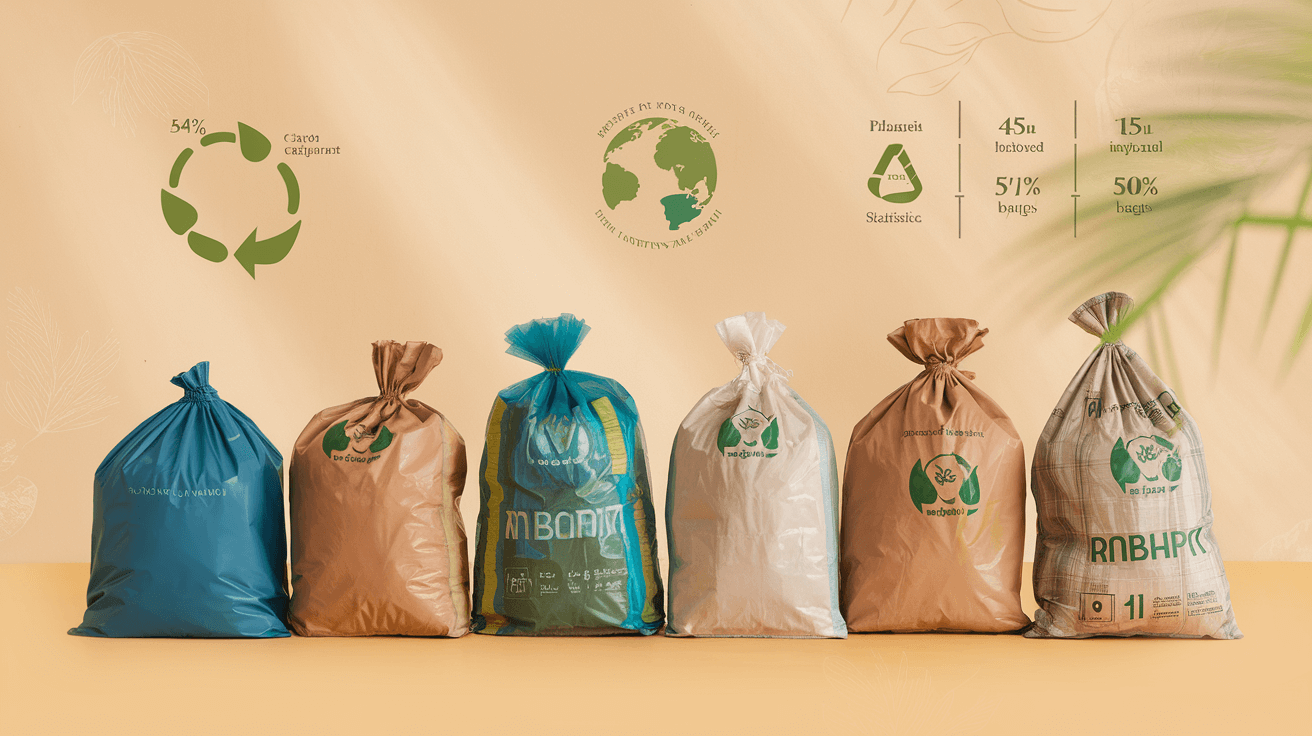
Features That Make Trash Bags Climate-Friendly
Now that we’ve examined the economic implications of sustainable waste management practices, let’s explore the specific features of trash bags that contribute to climate change mitigation efforts.
Odor-shielding Technology and Its Environmental Impact
While traditional plastic bags remain problematic for the environment, innovative odor-shielding technologies in eco-friendly alternatives serve multiple environmental purposes. Unlike conventional bags that rely on additional layers of plastic for odor control, many compostable options utilize natural materials that neutralize odors without toxic additives. This distinction is crucial as degradable bags often incorporate chemicals that break down plastics into harmful microplastics, whereas properly designed compostable bags with odor-shielding properties use plant-based barriers that decompose without toxic byproducts.
The environmental impact extends beyond the bag itself – effective odor containment encourages more consistent waste disposal habits and reduces the frequency of premature bag disposal, thereby decreasing overall consumption. Brands like UNNI and FORID have pioneered these technologies while maintaining their composting credentials.
Drawstring Designs for Secure Waste Containment
Secure closure systems, particularly drawstring designs, play a surprisingly significant role in climate-friendly waste management. When properly sealed, trash bags prevent leakage and contamination across waste streams – a critical factor for effective recycling and composting programs. The environmental advantage comes from both containment efficiency and structural integrity.
One challenge noted by sustainability experts like Asami Tanimoto is that many biodegradable and compostable options historically suffered from reduced durability compared to traditional plastic bags. However, modern drawstring designs have improved significantly, offering secure closure without compromising the bag’s ability to break down in appropriate facilities. This advancement addresses the practical concerns that previously limited adoption of eco-friendly alternatives.
Appropriate Sizing (13-gallon) for Household Efficiency
The seemingly mundane feature of bag size has substantial environmental implications. Standard 13-gallon bags are designed to maximize household efficiency by balancing capacity with practical usage patterns. This optimization helps minimize the number of bags consumed while ensuring full utilization of each bag.
From a climate perspective, appropriately sized bags support sustainable practices by:
- Reducing overall material consumption when compared to oversized alternatives
- Encouraging more conscious waste sorting due to limited space
- Supporting the efficiency of compost collection when using compostable varieties
- Ensuring bags are filled completely before disposal, maximizing the effectiveness of waste collection systems
While experts emphasize that the most effective approach to waste management remains overall reduction, choosing appropriately sized eco-friendly bags represents a practical step for households still generating waste.
With these features in mind, next we’ll examine how these climate-friendly trash bags can be integrated into a comprehensive waste strategy that addresses broader environmental goals while remaining practical for everyday use.
- FORCEFLEX TECHNOLOGY: Tall kitchen garbage bags expand around sharp edges and heavy loads, so you can pack in the trash …
- 2 LAYERS EXTRA LEAK PROTECTION: These 13 gallon kitchen trash bags are designed with 2 layers to handle heavy loads and …
- SCENTED GARBAGE BAGS: These Glad kitchen trash bags with Febreze Freshness infuse your space with just a hint of sparkli…
Integrating Trash Bags into a Comprehensive Waste Strategy
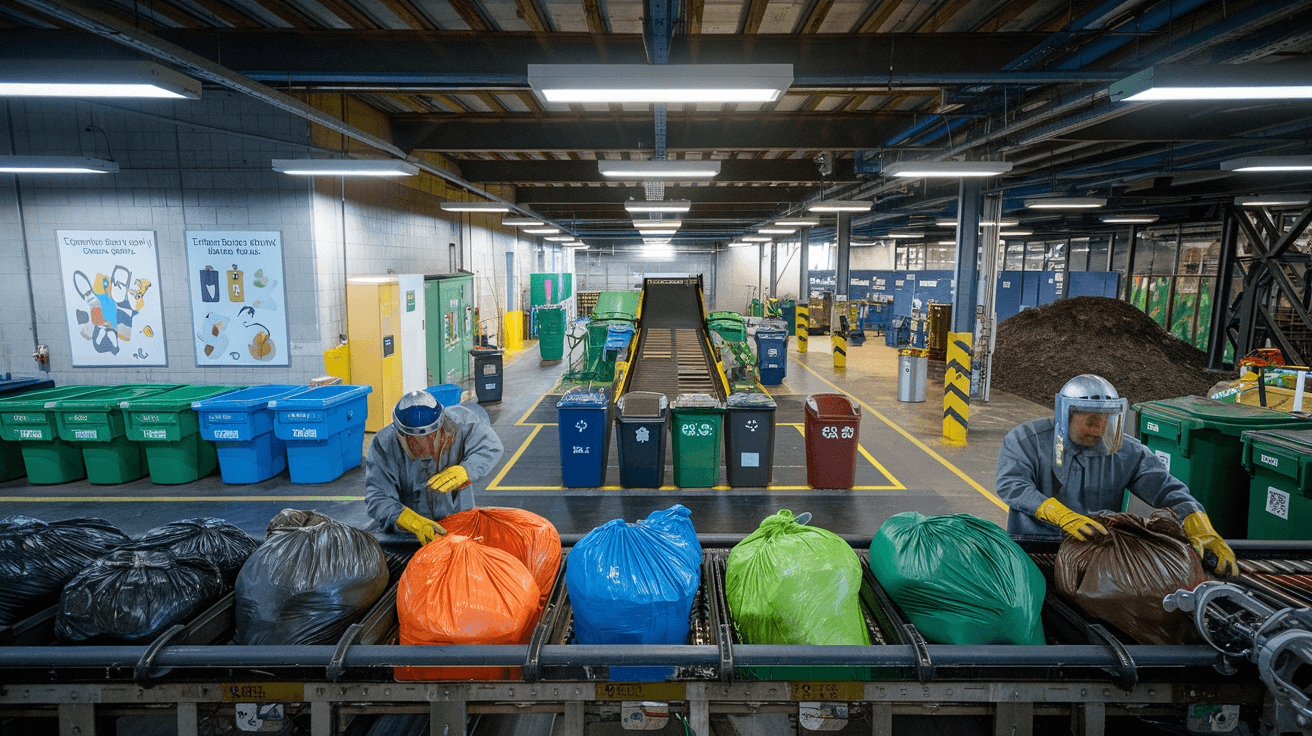
Integrating Trash Bags into a Comprehensive Waste Strategy
Now that we’ve explored the features that make trash bags climate-friendly, let’s examine how these products can be integrated into a broader waste management approach. Effective trash bag usage is just one component of a holistic strategy that can significantly reduce your environmental impact.
Pairing with Paper Products for Complete Waste Management
A truly effective waste management system requires proper categorization of waste materials. By pairing eco-friendly trash bags with paper products like recycling bins and compost containers, you can create a comprehensive sorting system. This approach allows for:
- Separate collection of organic waste in compostable bags
- Dedicated containers for recyclable materials like plastics, paper, glass, and metals
- Special disposal methods for hazardous waste items
This systematic approach ensures that each waste stream is handled appropriately, maximizing recycling potential and minimizing what ends up in landfills. By implementing proper sorting practices, households can contribute to lower greenhouse gas emissions and better conservation of natural resources.
Creating a Sustainable Household Supply System
Developing a sustainable waste management system involves more than just buying eco-friendly trash bags. Consider these strategies for your household:
- Establish dedicated collection points for different waste categories
- Implement the reduce-reuse-recycle hierarchy in your daily practices
- Incorporate composting for kitchen scraps and biodegradable materials
- Create a designated area for temporary storage of hazardous waste until proper disposal
By designing a thoughtful system that works for your living space, you can make sustainable waste management a seamless part of your routine. This approach not only improves your environmental footprint but also creates a cleaner, healthier living environment.
Reducing Shopping Trips Through Strategic Purchasing
Strategic purchasing of waste management supplies can further reduce your environmental impact:
- Buy sustainable waste management solutions in bulk to minimize packaging waste
- Coordinate purchases of compostable trash bags with other eco-friendly household items
- Plan shopping trips to reduce transportation emissions
- Choose products with minimal packaging when restocking your waste management supplies
This mindful approach to shopping extends beyond just waste management products. By applying the same principles to all household purchases – choosing minimal packaging, buying in bulk, and avoiding single-use plastics – you can significantly decrease your overall waste generation.
By integrating these strategies, your trash bag usage becomes part of a comprehensive waste reduction approach that addresses the full lifecycle of products entering your home, maximizing resource efficiency and minimizing environmental impact.
- FORCEFLEX TECHNOLOGY: Tall kitchen garbage bags expand around sharp edges and heavy loads, so you can pack in the trash …
- 2 LAYERS EXTRA LEAK PROTECTION: These 13 gallon kitchen trash bags are designed with 2 layers to handle heavy loads and …
- SCENTED GARBAGE BAGS: These Glad kitchen trash bags with Febreze Freshness infuse your space with just a hint of sparkli…
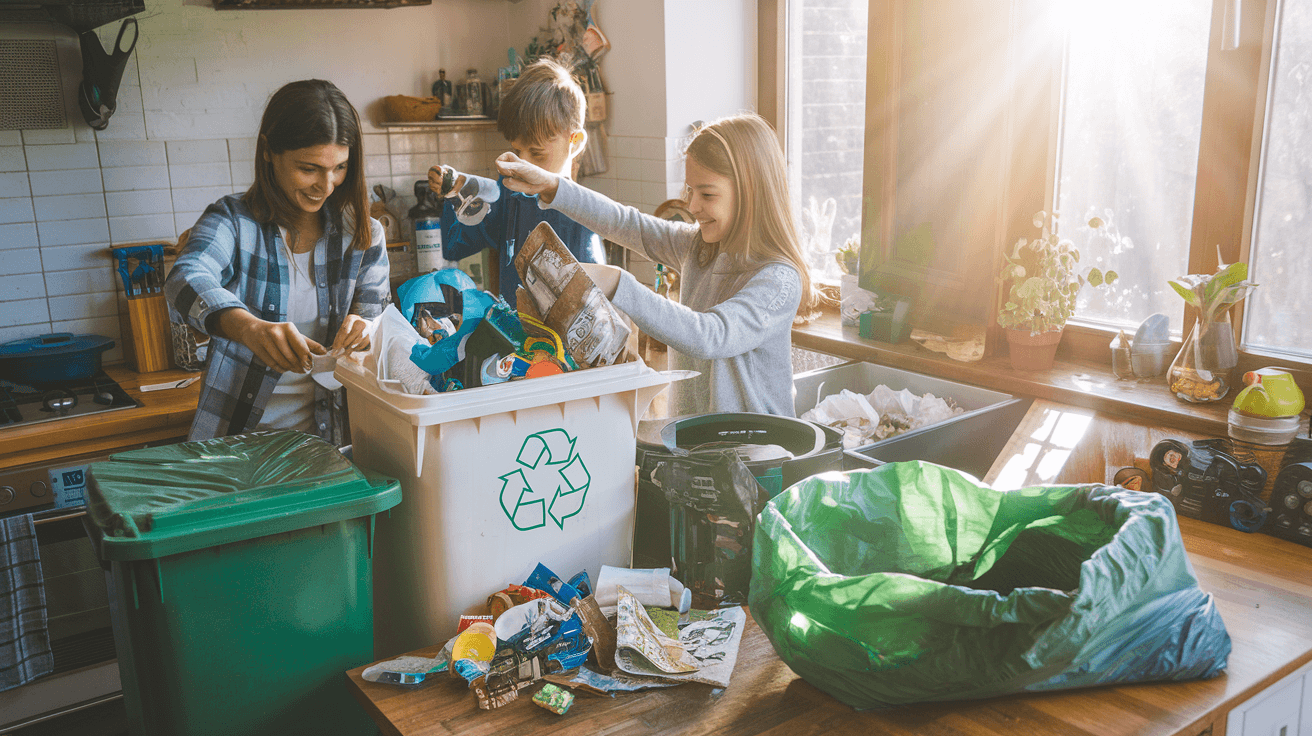
Embracing Garbage Trash Bags as Climate Change Warriors
Throughout this exploration, we’ve discovered how garbage trash bags have evolved from simple waste containers to strategic tools in our fight against climate change. From their sustainable production methods to their role in organized waste management systems, these everyday items serve as the first line of defense in responsible disposal. By selecting climate-friendly options like the Glad Tall Kitchen Drawstring Trash Bags with their odor-shielding technology, consumers make a meaningful contribution to environmental protection while maintaining household convenience.
The path toward a greener future requires both individual actions and systemic changes. As we integrate proper trash bag usage into our comprehensive waste management strategies, we amplify their impact beyond mere convenience. Next time you purchase household essentials, consider how your choices—even seemingly mundane ones like trash bags—fit into the larger environmental picture. By making informed decisions about the products we use daily, we collectively move closer to a more sustainable world where even the humble garbage bag plays a heroic role in preserving our planet for future generations.
- FORCEFLEX TECHNOLOGY: Tall kitchen garbage bags expand around sharp edges and heavy loads, so you can pack in the trash …
- 2 LAYERS EXTRA LEAK PROTECTION: These 13 gallon kitchen trash bags are designed with 2 layers to handle heavy loads and …
- SCENTED GARBAGE BAGS: These Glad kitchen trash bags with Febreze Freshness infuse your space with just a hint of sparkli…
Do you want more Articles? Please visit here…
This is Trending Products Zone. Trending Products Zone is a participant in the Amazon Services LLC Associates Program and other affiliate programs, such as the Costco Affiliate Program and, AliExpress Affiliate Program, designed to provide a means for websites to earn advertising fees by advertising and linking to partner sites. As an affiliate site, we may earn commissions from qualifying purchases made through links on our website, at no additional cost to you.







